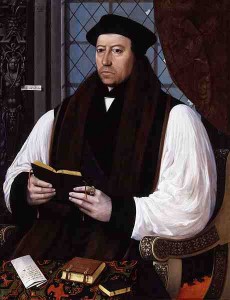 On 3rd May 1536, news of Queen Anne Boleyn’s arrest at Greenwich palace reached the ears of Thomas Cranmer, Archbishop of Canterbury. The archbishop was incredibly shocked that his good friend and patron had been arrested and he immediately wrote to the king.
On 3rd May 1536, news of Queen Anne Boleyn’s arrest at Greenwich palace reached the ears of Thomas Cranmer, Archbishop of Canterbury. The archbishop was incredibly shocked that his good friend and patron had been arrested and he immediately wrote to the king.
I don’t envy Cranmer writing this letter. On the one hand, he wanted to share his shock and defend the queen, but on the other hand he could not risk offending the king in any way and he really didn’t know what was going on. It had to be a very ‘diplomatic’ letter.
Hmm.. Cranmer obviously wanted to subtly protest Anne’s innocence while not offending the king in any way, which obviously shows us that he took some time writing this letter, to say the least.
I don’t envy him one bit. To see something like this happen to someone you care about and is your friend and knowing you can say or do nothing in their defense without putting your own life in danger must have been so terrible and frustrating. I am very impressed with Cranmer’s letter. At this time it would not have been easy to NOT offend Henry
Cranmers letter is carefully worded and I can imagine he agonised over it for quite a long time, he knew he daren’t offend Henry but it shows the strength of his loyalty and devotion to Anne by writing such a letter in the first place, it is a master of diplomacy and he just wanted the King to know how troubled he was and it was also a message of support for Anne, and it appears he was the only one who did so, there is no one else we know of who spoke a word in her defence, Cranmer is unique in this, most knowing the Kings temper decided to stay well silent, we have no record of Annes father pleading on her behalf but I believe he must have done, as Elizabeth would have wanted him to, it would be only natural her family would be shocked and very frightened, the court must a been a hub of whispered voices with people looking nervously over their shoulders, especially when Cromwell appeared round the corner like the harbinger of doom, in the Tower Anne was alone with her thoughts, had she known of Cranmers letter I don’t doubt she would have been very grateful.
I have to feel a bit sorry for Thomas Cranmer in this situation. He has to express his shock and disbelief about the news regarding the Queen whom he had held in high esteem for her love of reform and the Gospels. While Henry not Anne was his patron, she had supported his rise and his career and had a good relationship with the Archbishop. Before he came to Court and was introduced to Henry as someone who could resolve his annulment headache, Cranmer was an obscure but well educated cleric. His rise to the See of Canterbury gave him the opportunity to introduce his ideas for small arears of reform and obtained for Henry in months what others had failed in for seven years, his annulment from Katherine. Anne had been a friend and he was very fond of the Queen and admired her because she promoted new learning and reform.
He has to be as diplomatic as possible because the King is clearly sensitive and believed Anne to be guilty. He is writing to the King here, who is presenting himself to the world as the injured party, betrayed by his Queen, so he has to be careful not to push him over the edge and get himself in trouble. This was a powder keg waiting to explode. The last place Cranmer wanted to be was in the middle of this mess. He shows alarm at the terrible accusations against Anne, hopes the Queen will be cleared but also assures the King that he would not have proceeded without just cause. Cranmer is on a tight rope and he has to make certain he doesn’t say anything that will make Henry push him off.